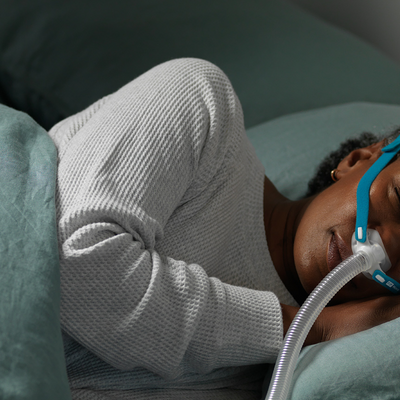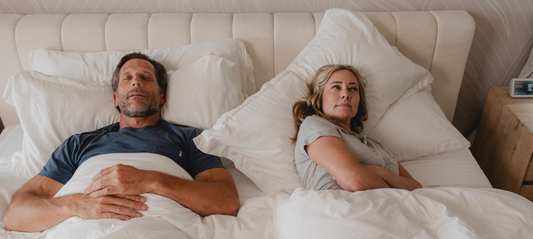If you find yourself waking up tired, or feeling like you never truly rest, you might be dealing with sleep apnea, a condition where your breathing repeatedly stops and starts during sleep. What many people don’t realize is that allergies could be making it worse. Seasonal sniffles and year-round nasal congestion might be playing a bigger role in the quality of your sleep than you think. But by managing your allergies you can actually improve your sleep apnea and get the restful sleep you deserve.
Dr. Robert Bocian, MD, PhD, FAAAAI and co-founder of Allermi has extensive experience helping patients to manage allergies and related challenges in order to improve their quality of life. He is joined today on the blog by Dr. Paul Schalch Lepe, MD, FACS, a physician who works with Lofta. Dr. Schalch Lepe is a renowned otolaryngologist and ENT doctor in San Diego, who is an expert in sinus, allergy, and sleep treatments. We looked to these two doctors to provide context on the ties between sleep apnea and allergies, and how to treat them to breathe and sleep better.
Understanding the Link Between Allergies and Sleep Apnea
Allergies, especially those that affect your nose (like pet dander or dust mite allergies), cause your nasal passages to get swollen and blocked. This leads to a stuffy nose, which can cause you to start breathing through your mouth instead of your nose when trying to sleep.
When you breathe through your mouth, especially when you’re in a deep sleep, the muscles in your throat naturally relax. If your nasal passages are already clogged, this relaxation can cause your airway to collapse, leading to what’s known as sleep apnea. Sleep apnea happens when your breathing is interrupted during sleep—sometimes for a few seconds, sometimes for over a minute. Your brain then has to wake your body up, even if just slightly, to resume breathing. This causes a disruption in your sleep and can leave you feeling exhausted the next day.
If you’re dealing with both allergies and sleep apnea, your stuffy nose might be more than just an annoyance—it could be a key player in your sleep troubles.
Why Inflammation Matters in Both Allergies and Sleep Apnea
Inflammation is a term that’s often associated with allergies and sleep apnea, but what really casues it? Inflammation is your body’s way of reacting to something it sees as harmful—such as pollen, dust, or pet dander. When it comes to allergies, this inflammation happens in your nose, causing it to swell up and block your airflow.
In sleep apnea, inflammation plays a different but related role. When your nasal passages are blocked because of allergies, you’re more likely to breathe through your mouth, which can lead to your airway collapsing during sleep. But sleep apnea itself also causes inflammation, which can spread throughout your body, making everything worse. This can lead to more serious health problems down the road, like heart disease or high blood pressure.
If you suffer from both allergies and sleep apnea, you’re stuck in a loop: allergies cause inflammation that makes sleep apnea worse, and sleep apnea causes even more inflammation.
How to Manage Allergies to Improve Your Sleep
The good news is that you don’t have to just live with these problems—there are ways to manage your allergies and, in turn, improve your sleep apnea. Many people who deal with both allergies and sleep apnea have found relief by taking control of their symptoms. Here’s how:
Avoid Allergens
This might sound obvious, but the first step in managing allergies is to avoid the things that trigger them. If you’re allergic to dust mites, for example, using dust-proof covers on your pillows and mattresses can help. If pet dander is your nemesis, keeping pets out of the bedroom is a good idea. And for those with pollen allergies, keeping windows closed during high pollen seasons can make a big difference.
Use A Nasal Spray
Allermi’s customized formula combines up to four ingredients to target your individual symptoms and provide relief. Allermi is designed to help reduce inflammation, making it easier to breathe at night. Patients who use Allermi nasal spray often report that they can breathe more easily at night, leading to deeper, more restful sleep.
Try CPAP Therapy
For sleep apnea, one of the most common treatments is CPAP therapy, where you wear a mask that helps keep your airway open while you sleep. A great place to start identifying CPAP therapy is by taking at-home sleep test, like this one from Lofta. However, if your nose is blocked, CPAP can be uncomfortable and harder to stick with. That’s why it’s so important to manage your allergies—when your nasal passages are clear, CPAP therapy is much more effective and easier to use.
The Importance of Quality Sleep for Your Overall Health
We all know that getting a good night’s sleep is important, but it’s worth repeating just how crucial it is for your overall health. When you sleep well, your body has time to repair itself, your mind can rest, and you wake up feeling refreshed and ready to take on the day. Poor sleep can lead to a host of problems, from memory issues and mood swings to more serious conditions like heart disease and diabetes.
By managing your allergies and improving your sleep apnea, you can break the cycle of poor sleep and start getting the rest you need. This isn’t just about feeling less tired—better sleep can lead to a healthier heart, a stronger immune system, and even a lower risk of depression and anxiety.
The Long-Term Impact of Not Treating Allergies and Sleep Apnea
Finally, it’s important to consider the long-term effects of not treating your allergies and sleep apnea. Untreated allergies can lead to chronic nasal congestion, making sleep apnea worse and increasing your risk of developing more serious health conditions like sinusitis or even cardiovascular disease. On the flip side, untreated sleep apnea can lead to high blood pressure, heart problems, and increased risk of accidents due to daytime sleepiness. By taking steps to manage your allergies and improve your sleep apnea, you can avoid these risks and start living a healthier, more energized life.
Conclusion
Allergies and sleep apnea might seem like two separate issues, but they’re closely linked—and managing one can help improve the other. By taking control of your allergies, whether through avoiding triggers, using medication such as Allermi nasal spray, or working with your doctor, you can breathe easier and get the restful, uninterrupted sleep you need. Your body and mind will thank you for it!
About Allermi Nasal Spray
Allermi nasal spray is designed to provide relief from nasal congestion, allergies, and sinus issues. By clearing your nasal passages, Allermi can help you breathe more easily while you sleep. This can reduce snoring, improve airflow, and enhance overall sleep quality.
Allermi offers a unique approach to allergy relief with its nasal spray that contains multiple active ingredients compared to regular nasal sprays which typically have just one. The Allermi formula is backed by science to give you the most effective allergy treatment for your individual allergy symptoms. This comprehensive formula provides immediate and long-term relief for all symptoms in one convenient bottle. What sets Allermi apart is its customization based on individual symptoms and severity, allowing for personalized treatment.
About Lofta
Lofta specializes in providing solutions for sleep apnea, particularly through the diagnosis and treatment of obstructive sleep apnea. They offer a range of services, including at-home sleep tests, personalized consultations, and access to CPAP therapy and devices.
Lofta aims to make the process of managing sleep apnea more accessible and convenient by offering a streamlined, end-to-end experience, from diagnosis to ongoing treatment support, with a focus on helping individuals improve their sleep and overall health.










































